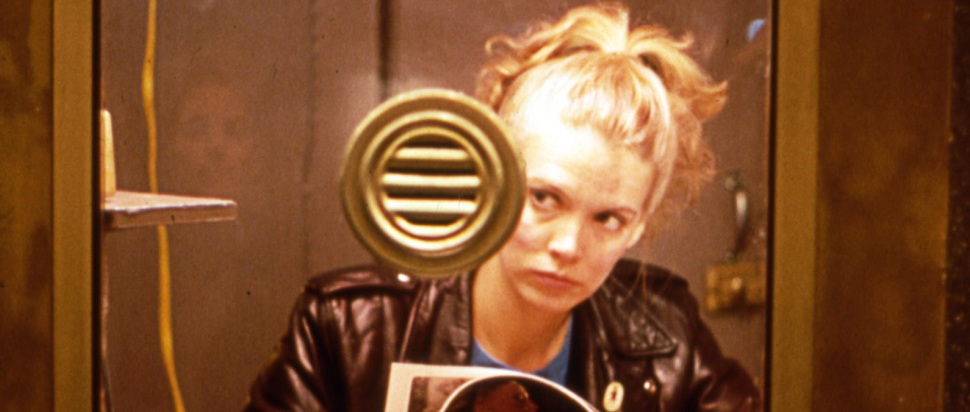EIFF 2023: Variety’s disruptive voyeurism at 40
On its 40th anniversary, Bette Gordon’s 1983 feminist classic Variety is back in cinemas. Let this subversive, sensuous neo-noir take you to the most uncomfortable places
Power is in the eye of the beholder. At its most compelling, cinema toys with the electrifying balance of camera, audience and characters, flipping the dynamic connected to the act of looking. Subverting the relationship between object and looker is the core of Bette Gordon's underground cult film Variety, which is celebrating its 40th anniversary this year with a UK rerelease and a screening at Edinburgh International Film Festival.
"Variety didn’t ever disappear," Gordon says over Zoom when we chat about her 1983 film, a genre-bending liberation parable set in New York's seediest, most delicious underbelly. An ever-relevant tale on the pleasure of looking, Gordon's neo-noir, co-written with punk author Kathy Acker, continues disrupting the status quo.
Eight years before its release, Laura Mulvey's essay Visual Pleasure and Narrative Cinema included a feminist reflection on the male gaze as a systemic, all-encompassing vision. Her argument sowed the seeds for overturning conventional narrative cinema which often reducing women to objects to be looked at. Gordon certainly shares Mulvey's sentiment. Mulvey ushered in a repositioning of the idea of looking, which Gordon translated into her story for the screen. "I'm a viewer too. And I like to watch," is Gordon's defiant response to the onscreen ramifications of the male gaze. "There has to be a place for my looking. And so I said, 'What if I switch things around?'"
A "child of cinema", Gordon was influenced by Hollywood films of the 1930s and 40s (think Alfred Hitchcock and Dorothy Arzner) and later in the 60s and 70s by the avant-garde filmmakers coming out of Europe (in particular Antonioni and Fassbinder) to push the boundaries of what could be shown and seen. Thus Variety was born, a tale of sexual awakening revolving around a Times Square porn cinema, a former vaudeville theatre that gives the film its title. The film centres on aspiring writer Christine (Sandy McLeod), who gets a job at Variety as a ticket seller. Her streetside booth "allows us to watch her looking back at those who are looking at her," says Gordon, as the film grows into a conscious reflection and re-framing of power and lust by way of windows, doorways and mirrors.
Christine becomes increasingly obsessed with one of Variety's older patrons, Louie (Richard M Davidson), a charming gangster type who may or may not be involved in criminal affairs. In a reversal of noir's gender conventions, Christine is the detective following the enigma, controlling the narrative and the space. The character is from Michigan and finds New York an inspiring place, as the city was for Gordon, who found a buzzing avant-garde scene where her filmmaking could thrive. "Everybody was free," says Gordon of those early days making films in the city. "We did not know the word 'business'. It was pure fun. Really, we made things to show each other."
Inspired by the director's own NYC late-night wanderings, Christine follows Louie through male-dominated spaces. It's the very masculine geography of the city that the filmmaker challenges here. Her camera enters Yankee Stadium, a fish market and a porn store in a documentary-like fashion. Even Wall Street, the setting of Christine's hazy montage of men shaking hands, isn't spared. Shot after shot, the protagonist dissects those unidentified men's bodies, virtually shrunk down to the ultimate male gesture of authority and connivance.
There's not an ounce of vulnerability in Christine. She doesn't sneak into those places; she parades through them, on the receiving end of weirded-out looks from men. But she looks back at them, breaking the cycle. In her determination to access conventionally closed-off environments, Variety's lead is a "classic heroine", as Gordon puts it. A male-dominated space in itself, the porn theatre allows Christine to observe both the women on the screen and the men looking at them. The film displays a very neutral attitude towards porn at a time when it was the heated subject of feminist debate.
"I was looking at pornography as a mechanism to explore female fantasy," says Gordon. "In porn, the touch is substituted by the look. It sustains this desire for something that's out of your reach." What shocked audiences back when Variety was released wasn't so much its explicit content, but that it somehow didn't fulfil its erotic thriller premise. "Sex, death and violence are not just the purview of men," says Gordon, and one can argue that Variety exists at the intersection of these elements. There's the promise of all three in the film, but the credits roll on an exhilaratingly open-ended finale, which elated half of the audience at its world premiere at Cannes and enraged the other half.
Reception has warmed over time, Gordon says, though she can't explain why. Modern viewers may have become more comfortable with uncertainty. We've learned to sit with those feelings in the back of a cinema, a prerequisite to "the most essential experience you can have," as the director defines visual storytelling. Representation doesn't ever satisfy desire, but it certainly fuels it, Variety suggests. The film's spellbinding resonance proves how commanding that unfulfilled yearning can be 40 years on.
Variety screens at the Edinburgh International Film Festival on 20 Aug and is rereleased across the UK on 11 Aug
